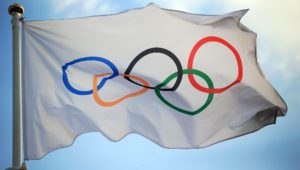Geroid Towey writes about disappointment in the Olympic Regatta
Final proves a bridge too far
After our repechage, we were upbeat and felt like we were on the cusp of making the semi-final one of our best races at the Games. We needed to, because the group draw pitted us against the top teams in the world with only three teams to emerge from the battle as finalists.
We drew current world champions (Great Britain), current Olympic champions (Denmark), current world silver medalists (France) and current world bronze medalists (Italy) along with the United States.
We were by no means fazed by the task in hand and quite often during the year had found ourselves in the mix with these crews at various World Cup regattas. And here at the Games all teams posted similar times in the heats
What was on our minds, though, was that we would have to tick all boxes in the race in order to qualify. This meant concentrating, as much as possible, on our own performance. The other semi looked less daunting, especially when the German crew, who were motoring in the heats, had to withdraw when three of them developed gastro problems and fever and were pulled from the competition. Sport can be so cruel.
Thursday was semi-final day and we arrived to the course nervous, but ready. We went for our warm up paddle around 1pm and the sky was exceptionally dark – a storm was brewing. By the end of four kilometres we were enveloped in car-wash like conditions as all rowers scrambled for the boathouses with lightning crackling overhead.
The rain and wind stayed with us for the afternoon, and after weighing in and spending about an hour looking at the conditions from our little resting area, the organisers decided to call it a day and re-schedule the racing for Friday. Rain is usually not a problem for rowers, but lightening poses a significant risk as our boats and oars are made of carbon fibre, and nobody felt like working for the Chinese National Grid! We boarded the bus back to the village in a strange mood. All teams would have been ready to race within an hour of the cancellation so there was all this pent up emotion but with no race to release it. The key was to come down, totally switch off and build back up for the following day.
So, on Friday, we went through the same process, albeit under blue skies. This would finally be the day.
We needed to get out fast with the leaders and our race was stacked with the fastest starters in the business. Our starts in previous races had been a bit slower than the opposition but we used to put them under intense pressure in the second half of the race. The key for the semi was to limit the damage in the first section and then move at half-way like we always did.
As everyone knows, we finished fourth in the semi. We probably paid technically for the quicker start as it took us a long time to find our rhythm. We were in contention for much of the race and ran out of steam with 250 metres to go. The three boats ahead of us were quicker than us on that day and even though we felt the race was not our best performance of the Games, we took some solace from the fact that as a unit, we could not have worked any harder.
The point of any race like that is to come off the water empty, unable to give anything more. It takes something – whether courage or foolishness – to push yourself to the state where you can say that, but all four of us could not have taken another stroke. Our build-up and regatta was unaffected by illness or injury and we were given a clean run up to the Games. We were in excellent shape.
Fortunately that is the work ethic which exists in rowing. Its knocked into you at an early age and brings a certain satisfaction after every difficult race. Rowing is a beautiful sport, very technical, but it is also extremely painful. I remember asking myself when I was around thirteen, why am I doing this to myself?
Eighteen years later, the same thought runs through my mind most days. I guess I liked it because it was fringe and it was pure – traits that are somewhat unique in top level Olympic sport.
I guess all sports careers are like a never-ending project, looking for that perfect race at the right time. Thats the motivation which keeps most people going and the more elusive it is, the more people want it.
On the way back to the village on the bus I finally found out why the volunteers are always smiling. I was cocooned in my sunglasses and mp3 player, trying to make sense of what just happened when a volunteer sat beside me and started asking me questions about where I am from etc . . .
He was trying to improve his English. After a series of questions he then asked me if there was anything I would like to ask about China.
I replied: Yes, how can you volunteer for this and maintain a permanent smile, even though you are exhausted and not having much fun??
He then showed me a yellow wristband, like the LIVESTRONG ones, that all the volunteers are wearing here. Written in on the wristband, in Chinese, he translated the words. We shall smile.
After missing out on the Olympic final, my next question asked was where I could I get my hands on one!






